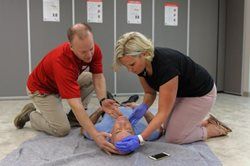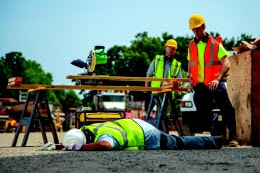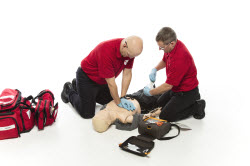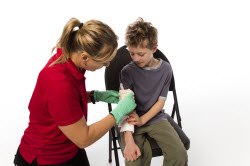Blended Courses
The Blended Course is a combination of online learning followed by onsite hands-on instruction. The theory portion is conveyed to the participants outside of the classroom through an online component. This allows for the in-class component to follow and concentrate on skill development and the application of theory. In the case of the Red Cross First Aid courses, a self-paced online session must be completed first, followed by an in-class skills session with a Red Cross First Aid Instructor.
Emergency First-Aid / Basic First Aid (FA1)
Basic one-day course offering lifesaving first aid and cardiopulmonary resuscitation (CPR) skills for the workplace or home. Course meets legislation requirements for provincial/territorial worker safety and insurance boards and includes the latest first aid and CPR guidelines.

Duration: CPR A: 6.5 hours in-class OR 3.5 hours in-class + 4 hours online learning** CPR C: 7.5 hours in-class OR 4.5 hours in-class + 4 hours online learning**
Completion: Successfully demonstrate skills and critical steps Min. 75% mark for written knowledge evaluation Attend and participate in 100% of the course
Certification: 3-year certification in Emergency First Aid, CPR level A or C
Recertification: CPR A: 4 hours in-class OR 3 hours in-class + 4 hours online learning** CPR C: 5 hours in-class OR 4 hours in-class + 4 hours online learning** Level A, C, or HCP
Course Content:
Preparing to respond
The EMS system
Check, Call, Care
Airway emergencies
Breathing and circulation emergencies
First aid for respiratory and cardiac arrest
Wound care
Includes any other content required by specific legislation
Standard First-Aid / Intermediate First Aid (FA2)
Comprehensive two-day course offering first aid and cardiopulmonary resuscitation (CPR) skills for those who need training due to work requirements or who want more knowledge to respond to emergencies at home. Includes the latest first aid and CPR guidelines. Meets federal and a variety of provincial/territorial regulations for Standard First Aid and CPR. Exceeds competitors’ standards by including injury prevention content, CPR, and AED.

Duration: 16 hours
Completion: 100% attendance, skills demonstration, and 75% min. passing grade on written exam
Certification: 3-year certification in Standard First Aid, CPR Level A, C, or HCP, and AED
Recertification: 6.5 – 7.5 hours; includes CPR Level A, C, and AED; adheres to local legislation OR 3 -4 hours in-class + 4 hours online learning** Course Content: The Red Cross
Preparing to respond
The EMS system
Check, Call, Care
Airway emergencies
Breathing and Circulation emergencies
First aid for respiratory and cardiac arrest
Wound care Head and spine injuries
Bone, muscle, and joint injuries
Sudden medical emergencies
Environmental emergencies
Poisons
Includes any other content required by specific legislation
A 60-minute Opioid Poisoning Awareness Workshop can be added to this course. In this workshop, participants will learn how they can help prevent death and disability by recognizing, accessing help, and providing care for suspected opioid poisoning.
CPR (Full & Recert. )
Courses on cardiopulmonary resuscitation (CPR) provide the skills needed to recognize and respond to cardiovascular emergencies and choking for adults, children, and babies depending on the level of CPR chosen. All include training in the use of an automated external defibrillator (AED). Courses offer training suitable for workplace or general interest. Includes the latest CPR guidelines.

Duration: 6 hours
Completion: 100% attendance, skills demonstration, and 75% min. passing grade on written exam
Certification: 3-year certification in Standard First Aid, CPR Level A, C, or HCP, and AED
Recertification: 4 hours; includes CPR Level A, C, or HCP and AED; adheres to local legislation
Course Content:
Level HCP
Level C content
Jaw thrust
Pulse check
Rescue breathing—adult, child, and baby
BVM—adult, child, and baby
Two-rescuer CPR—adult, child, and baby
Includes any other content required by specific legislation
First-Aid Instructor courses
CPR Instructor
CPR Instructors support the Red Cross First Aid Program through the delivery of our CPR courses. Candidates enter our comprehensive Instructor Development Program, designed to prepare them to support dynamic, learner-centered classroom environments.
First Aid and CPR Instructor
First Aid & CPR Instructors support the Red Cross First Aid Program through the delivery of our First Aid and CPR courses. Candidates enter our comprehensive Instructor Development Program, designed to prepare them to support dynamic, learner-centered classroom environments.
Instructor Development-Professional Responder Program
Designed for candidates who wish to deliver Canadian Red Cross Professional Responder courses, including Basic Life Support (BLS), First Responder (FR), Advanced First Aid (AFA), Emergency Medical Responder (EMR), Oxygen Therapy (OT), Marine Advanced First Aid (MAFA) and Airway Management (AM). Course content focuses on instructional techniques, including designing and supporting scenarios, organizing courses, and how to support dynamic, learner-centered classroom environments.
Instructor Development – Wilderness & Remote First Aid Program
Designed for candidates who wish to deliver Canadian Red Cross Wilderness & Remote First Aid courses, including Remote First Aid, Wilderness First Aid, and Wilderness First Responder. Course content focuses on instructional techniques, including delivering scenarios, organizing courses, and how to support dynamic, learner-centered classroom environments.
Youth Leader
Youth Leaders support the Red Cross Youth First Aid Program through the delivery of our Stay Safe! and Babysitting courses. With the required prerequisites, candidates enter into our comprehensive Youth Leader Development Program, designed to prepare them to support dynamic, learner-centered classroom environments.
Advanced Training
Building on the knowledge and skills within the Emergency Care for Professional Responders text, learners will gain the knowledge and skills needed to provide appropriate patient assessments, interventions, and ongoing care in the workplace. The various options for transportation of an injured worker from the workplace to a healthcare facility are also covered. This course meets CSA Standard Z1210-17 First Aid Training for the Workplace.

Audience: For those primarily designated with the responsibility as an Advanced Workplace First Aid Attendant. In some jurisdictions, this advanced first aid course is approved for pre-hospital medical first responders.
Prerequisites: Participants must be certified in Standard First Aid with CPR level C.
Duration: 80 hours (based on the jurisdiction)
Completion: 100% attendance, skills demonstration, and 75% min. passing grade on written exam
Certification: 3-year certification in Standard First Aid, CPR Level A, C, or HCP, and AED
Recertification: 6–9 hours; includes CPR Level A, C, or HCP and AED; adheres to local legislation
Course Content:
Preparing to respond
The EMS system
Check, Call, Care
Airway emergencies
Breathing and circulation emergencies
First aid for respiratory and cardiac arrest
Wound care
Head and spine injuries
Bone, muscle, and joint injuries
Sudden medical emergencies
Environmental emergencies
Poisons
Includes any other content required by specific legislation
BLS CPR (Basic Life Support)
Designed to build participant confidence in performing cardiopulmonary resuscitation (CPR) skills in a team environment for professionals with a duty to respond. Teaches the important steps to perform a rapid assessment, perform Basic Life Support (BLS) skills, and perform rapid defibrillation including the use of an Automated External Defibrillator (AED). Airway Management and Oxygen Therapy can also be added as additional certifications to this course.
Audience: In-facility care providers, including nursing staff, care aides, medical and dental professionals. Pre-hospital care providers, which may include professionals in fire service, rescue teams, sports medicine, lifeguards, and ski patrol.

Duration: Stand-alone course – 4 hours *With Airway Management – 5 hours *With Oxygen Therapy – 5 hours *With Airway Management and Oxygen Therapy – 6 hours
Completion: Successfully demonstrate all course skill competencies
Minimum 75% mark for written, closed book, knowledge evaluation
Attend and participate in 100% of the course
Certification: 1-year certification in Basic Life Support (digital certificate issued upon successful completion)
Recertification: 2 hours
Course Content:
Glove removal
Primary Assessment
Cardiopulmonary Resuscitation (CPR) and Automated External Defibrillator (AED)
Airway Obstruction
Assisted Ventilation
Basic Life Support special considerations
ACLS (Advanced Cardiac Life Support)
Advanced Cardiovascular Life Support (ACLS) is the pre-eminent resuscitation course for the recognition and intervention of cardiopulmonary arrest or other cardiovascular emergencies. This advanced course builds on the foundation of basic life support (BLS) skills and takes healthcare provider training to the next level. Learners can expect practice and training in high-performance team dynamics and communication, systems of care, immediate post-cardiac arrest care, acute dysrhythmia, stroke, and acute coronary syndromes. Learn to become a practiced and strong member or lead an ACLS team with this important training program.
Prerequisites: Current Heart & Stroke BLS Provider certification and ACLS pre-course self-assessment certificate (passing score = 70%)
Duration: 14 hours
Completion: Successfully demonstrate all course skill competencies
Minimum 75% mark for written, closed book, knowledge evaluation
Attend and participate in 100% of the course
Certification: 2-year certification
Recertification: 7 hours
Course Content:
Systematic approach
High-quality CPR (application of Basic Life Support skills to case scenarios)
Airway management
Rhythm recognition
Defibrillation
Intravenous (IV)/ intraosseous (IO) access
Use of medications
Cardioversion
Transcutaneous pacing
Team dynamics
Stay Safe (9-13 years old*)
Real-world scenarios often call on children to respond to challenges. The Stay Safe! program teaches applicable and age-appropriate skills while increasing and reinforcing a youth’s capacity to improve his or her own safety. Whether in their community or on their own, this group will be given better tools to Stay Safe! in a variety of different situations.
Duration: 5 – 6 hours
Course Content:
Importance of responsibility and respect while being accountable for yourself
Importance of setting and following rules around safety when staying on your own
How to stay safe at home and within the community
How to prepare, recognize and respond to unexpected situations, (i.e. inclement weather, strangers, unanticipated visits)
First Aid Content:
Check, Call, Care (includes phoning EMS/911), recovery position, conscious choking (adult/child/alone), feeling unwell, asthma (includes the use of inhaler and spacer), anaphylaxis (includes the use of EpiPen), poisoning, insect stings, wound care (i.e. minor cuts and scrapes, splinters, nosebleeds, bumps and bruises, life-threatening bleeding, burns)
* Please check with provincial regulations.
Additional Resources
Printable version – Stay Safe! Course
Babysitting (11 to 15 years old*)
The Babysitting course refreshed and revised, now has a greater emphasis on First Aid skills. The Canadian Red Cross Babysitting course covers everything from managing difficult behaviours to essential content on leadership and professional conduct as a babysitter. Babysitting promises to deepen and enhance the responsibility that older youth feel when caring for younger children. This updated curriculum, complete with new science, also provides improved learning when it comes to giving the appropriate care in the event of an emergency.
Duration: 7 – 8 hours
Course Content:
First Aid Content:
Check, Call, Care (includes phoning EMS/911), glove removal, recovery position, conscious choking (adult/child/baby/alone), CPR (baby/child), illness, asthma (includes the use of inhaler and spacer), anaphylaxis (includes the use of EpiPen), poisoning, insect stings, wound care (i.e. minor cuts and scrapes, splinters, nosebleeds, bumps and bruises, life-threatening bleeding, burns), head, neck and back injuries, broken bones, seizures
Reference text with embedded critical thinking activities that will reinforce content
* Please check with provincial regulations.
Additional Resources for Babysitting
Printable version – Babysitting Course
Emergency Child Care First Aid & CPR
A basic one-day course designed to introduce caregivers to injury prevention skills and knowledge. The course covers lifesaving first aid skills and cardiopulmonary resuscitation (CPR and AED) for children, and babies. Course meets legislation requirements for provincial/territorial early childhood education and daycare worker safety requirements*.

Duration: 8 hours
Completion: 100% attendance & participation of the course, skills and critical steps successful demonstration, and 75% min. passing grade on written exam
Certification: 3-year certification Emergency Child Care First Aid
Recertification: 6 hours in-class** Course Content: The Red Cross
Responding to Emergencies
The EMS system
Check, Call, Care
Airway emergencies
Breathing and Circulation emergencies – Child and baby
First aid for respiratory and cardiac arrest – Child and baby
Wound care Head, Neck, and spine injuries
Bone, muscle, and Joint injuries
Sudden Medical Emergencies
Environmental Illness
Poisons
Caring for Children
Printable version – Emergency Child Care First Aid & CPR Course
Opioid Crisis Intervention Skills Training
This informational fact-based training session provides the skills needed to recognize and respond to an opioid crisis. Includes hands-on training in the use of Naloxone (Narcan).*Course suitable for any workplace including volunteer-based organizations or general interest.
Duration: 3 hours
Completion: 100% attendance & participation in the course, skills demonstration
Retraining: Recommended every 2 years Course Content:
Intro to Opioids
Types of drugs – Oral, Injecting, Inhaling
Myth-busting
Intro to Naloxone – Narcan Drugs this will work on
Opioid Overdose – Signs & Symptoms
Demo administration of Naloxone
CPR & AED review